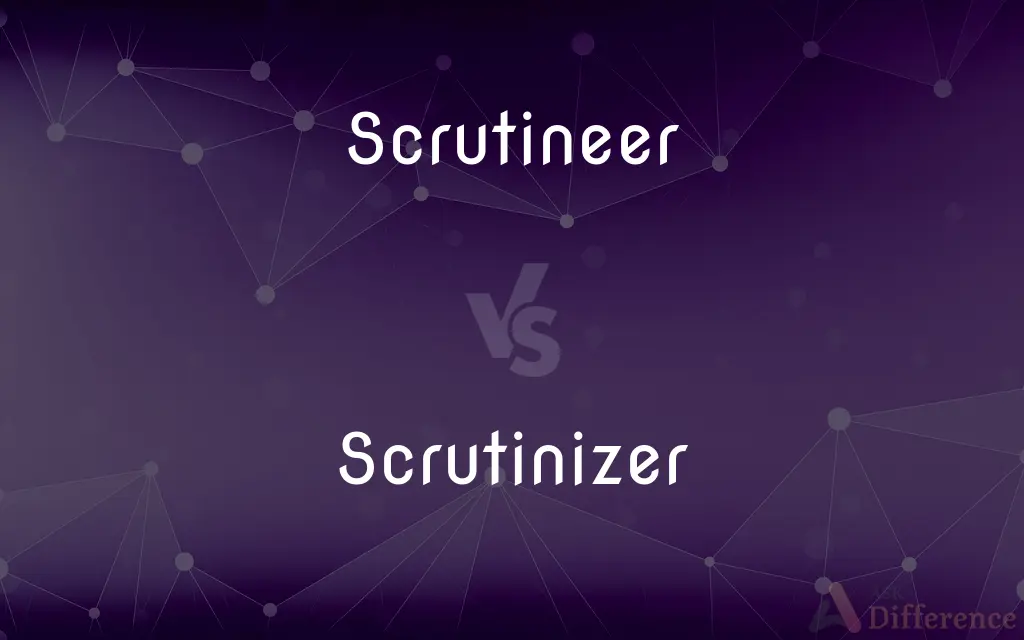Scrutineer vs. Scrutinizer — What's the Difference?
By Urooj Arif & Maham Liaqat — Updated on March 19, 2024
A scrutineer is someone officially appointed to examine and report on election or contest results. A scrutinizer, however, is anyone who examines something closely or critically.

Difference Between Scrutineer and Scrutinizer
Table of Contents
ADVERTISEMENT
Key Differences
A scrutineer typically holds an official role or duty, especially in the context of elections, where they ensure the process is fair and transparent, verifying the accuracy of the vote count. Whereas a scrutinizer can be anyone who examines or inspects something with great detail and critical attention, without necessarily having an official capacity.
Scrutineers are often found in formal settings, such as political elections, academic examinations, or competitions, where their main function is to observe and report on the adherence to rules and procedures. On the other hand, scrutinizers operate in a wider range of contexts, from academic research to everyday scenarios, applying a critical eye to assess or analyze information, objects, or situations.
The role of a scrutineer is usually bound by specific rules and guidelines, which aim to maintain integrity and transparency in the process they are overseeing. Scrutinizers, however, rely on their personal or professional judgment to conduct their examination, and their scrutiny can be driven by curiosity, skepticism, or the pursuit of knowledge.
While scrutineers contribute to the legitimacy and fairness of formal proceedings, scrutinizers play a crucial role in critical thinking, questioning, and understanding across various domains. Both, however, share the common goal of seeking truth or accuracy through careful examination.
The selection and appointment of scrutineers are often governed by regulations or bylaws, emphasizing their formal and official function in ensuring procedural correctness. Scrutinizers, in contrast, can emerge spontaneously or through self-selection, driven by an interest or need to investigate or evaluate.
ADVERTISEMENT
Comparison Chart
Definition
Officially appointed to examine and report on specific tasks.
Examines or inspects something closely without official duty.
Context
Elections, contests, academic examinations.
Any scenario requiring detailed examination or critique.
Purpose
Ensure fairness, transparency, and adherence to rules.
Understand, critique, or assess with detail and criticality.
Authority & Appointment
Appointed by governing bodies or organizations.
Self-selected or based on personal/professional interest.
Scope of Role
Bound by specific rules and guidelines.
Driven by curiosity, skepticism, or pursuit of knowledge.
Compare with Definitions
Scrutineer
An individual checking for adherence to rules.
In the chess tournament, scrutineers watched for any rule violations.
Scrutinizer
A person who examines something critically.
The scrutinizer of the report found several inaccuracies.
Scrutineer
An observer ensuring procedural correctness.
Scrutineers at the debate competition ensured all rules were followed.
Scrutinizer
Someone looking closely at aspects to understand them better.
A financial scrutinizer assessed the company's accounts.
Scrutineer
A person appointed to oversee a contest or examination.
The dance competition had scrutineers to judge performances fairly.
Scrutinizer
Anyone who inspects with great attention to detail.
As a scrutinizer, she reviewed every clause of the contract.
Scrutineer
An official examiner of votes in an election.
Scrutineers ensured the ballot count was accurate.
Scrutinizer
An individual analyzing or investigating thoroughly.
The scrutinizer spent hours examining the artifact.
Scrutineer
Someone responsible for verifying election results.
The scrutineer confirmed the integrity of the voting process.
Scrutinizer
A critical observer in various contexts.
The play’s director was a scrutinizer of every actor's performance.
Scrutineer
A scrutineer (also called a poll-watcher or a challenger in the United States) is a person who observes any process which requires rigorous oversight. Scrutineers have the tasks of preventing the occurrence of corruption and of detecting genuine mistakes.
Scrutinizer
A careful examiner; someone who inspects with great care
Scrutineer
A person who scrutinises; a person responsible for scrutineering.
Scrutinizer
To examine or observe with great care; inspect critically.
Scrutineer
A poll-watcher.
Scrutinizer
One who scrutinizes.
Scrutineer
(Canada) A person who observes any process which requires rigorous oversight.
Scrutinizer
One who scrutinizes.
Scrutineer
(transitive) To scrutinise; to thoroughly check that an election is being run fairly, or that a vehicle meets the rules of a competition, etc.
Scrutineer
A scrutinizer; specifically, an examiner of votes, as at an election.
Scrutineer
Someone who examines votes at an election
Common Curiosities
Do scrutineers have the power to make decisions?
Scrutineers report on findings and ensure rules are followed but usually do not make final decisions on outcomes.
Is the role of a scrutineer limited to elections?
While elections are a common context, scrutineers also function in contests, examinations, and other formal settings requiring rule adherence.
What skills are important for a scrutinizer?
Critical thinking, attention to detail, and a thorough understanding of the subject matter are crucial.
What motivates a scrutinizer?
Curiosity, the pursuit of truth, skepticism, or the desire to improve or understand something deeply.
Can scrutinizers influence outcomes?
While their main role is examination, their findings can lead to significant changes or insights.
What qualifications does a scrutineer need?
Scrutineers are often required to have a clear understanding of the rules and procedures of the process they are overseeing.
Can anyone become a scrutinizer?
Yes, scrutinizing does not typically require formal qualifications; it's more about having a critical and attentive mindset.
How does someone become a scrutineer?
Appointment as a scrutineer typically comes from relevant authorities or organizations that manage the specific event or process.
Are scrutineers always impartial?
Scrutineers are expected to be impartial to maintain the integrity of the process they oversee.
What’s the difference in responsibility between a scrutineer and a scrutinizer?
Scrutineers have official responsibilities to oversee specific processes, while scrutinizers take on a more general role of detailed examination.
Share Your Discovery

Previous Comparison
Litotes vs. Hyperbole
Next Comparison
Pic vs. SicAuthor Spotlight
Written by
Urooj ArifUrooj is a skilled content writer at Ask Difference, known for her exceptional ability to simplify complex topics into engaging and informative content. With a passion for research and a flair for clear, concise writing, she consistently delivers articles that resonate with our diverse audience.
Co-written by
Maham Liaqat













































